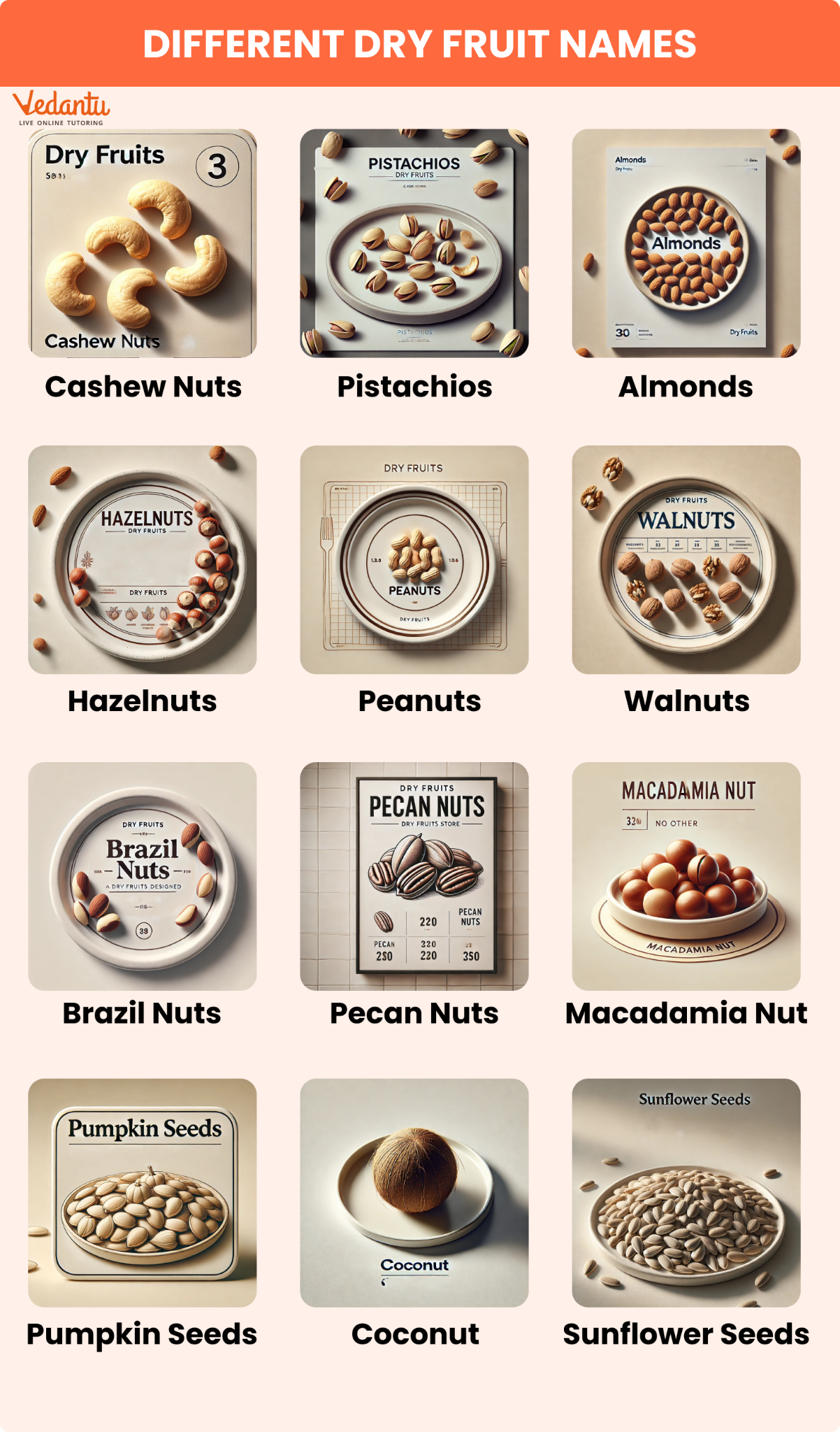




List of Common Dry Fruits and Their Key Benefits
FAQs on Dry Fruit Names: Learn, Remember, and Enjoy Healthy Snacks
1. What are dry fruits?
Dry fruits are fresh fruits from which most of the original water content has been removed, either naturally through sun-drying or artificially using dehydrators. This process preserves the fruit, concentrates its nutrients, and gives it a long shelf life. Common examples include raisins (dried grapes) and apricots (dried apricots).
2. Can you name 10 common dry fruits and nuts?
Certainly! Here is a list of 10 popular dry fruits and nuts often enjoyed as snacks:
Almonds (Badam)
Walnuts (Akhrot)
Cashews (Kaju)
Pistachios (Pista)
Dates (Khajoor)
Raisins (Kishmish)
Dried Figs (Anjeer)
Dried Apricots (Khumani)
Prunes (Dried Plums)
Fox Nuts (Makhana)
3. Why are dry fruits considered healthy snacks for students?
Dry fruits are considered healthy because they are a concentrated source of energy, vitamins, minerals, and fibre. Since the water is removed, the nutrients become more packed. They provide a quick energy boost, which is great for studying, and the fibre helps you feel full and aids digestion. For example, a few almonds and walnuts can be a power-packed snack during exam preparation.
4. What is the main difference between a dry fruit and a nut?
The main difference lies in their origin. A dry fruit, like a raisin or a prune, is a fruit that has been dried. A nut, such as a walnut or an almond, is technically a type of fruit with a hard shell and a seed inside. However, in everyday language and cooking, we often group them together because they are used in similar ways and have similar nutritional benefits.
5. How are dry fruits made from fresh fruits?
Dry fruits are made by a process called dehydration, which means removing water from the fresh fruit. This is primarily done in two ways: sun-drying, where fruits are laid out in the sun for several days, and mechanical drying, where machines use controlled heat and air to remove moisture much faster. This process prevents the fruit from spoiling and preserves it for a long time.
6. What are some popular ways to include dry fruits in our daily meals?
There are many delicious ways to add dry fruits to your diet. You can:
Add chopped almonds or walnuts to your morning cereal or oatmeal.
Mix them into a trail mix for a healthy on-the-go snack.
Use raisins or dates as a natural sweetener in cakes, muffins, or milkshakes.
Incorporate them into traditional Indian sweets like ladoos or kheer.
7. Is it better to eat dry fruits or fresh fruits?
Both fresh and dry fruits are healthy, but they offer different benefits. Fresh fruits have high water content and are rich in vitamins like Vitamin C, which can be lost during drying. Dry fruits offer a concentrated amount of fibre, minerals, and calories. While dry fruits are a great energy source, they should be eaten in moderation due to their higher sugar and calorie density. A balanced diet should ideally include both.
8. How should we store dry fruits to keep them fresh for a longer time?
To keep dry fruits fresh and prevent them from spoiling, you should store them in an airtight container in a cool, dark, and dry place like a pantry. This protects them from moisture and pests. For longer-term storage, especially in warm climates, keeping them in the refrigerator is an excellent option to maintain their flavour and prevent them from becoming rancid.
9. Which dry fruits are particularly good for brain health and memory?
Certain dry fruits are well-known for their brain-boosting properties. Walnuts are rich in omega-3 fatty acids, which are essential for brain function. Almonds are a great source of Vitamin E, an antioxidant that helps protect brain cells from damage. Including a small portion of these in your daily diet is often recommended to support concentration and memory.
10. Do dry fruits have any common allergens I should be aware of?
Yes, it's very important to be aware of allergies. Many items we call dry fruits are actually tree nuts, which are common allergens. These include almonds, walnuts, cashews, and pistachios. If you or someone in your family has a nut allergy, it is crucial to read food labels carefully and avoid these specific items to prevent an allergic reaction.























